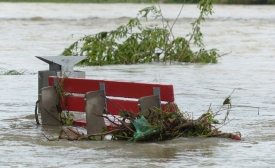global warming
What is science diplomacy? It is a growing political concept of using science as a means of foreign policy. Foreign policy is no longer exclusively hard diplomacy, but can include the exchange of knowledge, the exchange of scientists, and cooperation between states regarding prevalent science issues. [...] For example, in the Arctic it strengthens cooperation as a whole and serves as a means of deepening cooperation in other fields—what we call a spillover effect.
Sam Geall, the executive editor of China Dialogue, a bilingual website on the environment, said Beijing viewed having a climate change denying US president as a rare and unexpected opportunity to boost Chinese soft power by positioning itself as the world’s premier climate change fighter.
The 2016 UN climate conference ended last week with reaffirmation by nearly 200 countries of their "highest political commitment" to combating global warming. With the landmark Paris agreement now ratified, the conference delivered what former US Vice President Al Gore called a "bold vision that sets the pace for the world's efforts to implement the deal".
Taiwan’s meaningful participation in the UNFCCC in Marrakech this year and beyond, therefore, is essential to that achievement of these goals. Climate change is an issue of global concern that cuts across national boundaries and narrow political considerations. No nation, including Taiwan, can do it alone. We are more than willing to contribute our full share to the challenge presented by environmental protection.
The Olympic Games are all about athletics and sportsmanship, for sure. But this year’s games in Rio have also put a spotlight on the environment. Sustainability is playing a big part [...] All the athletes got a chance to plant seedlings native to Brazil in silver containers on the stadium floor. After the Olympics is over, the seeds will be replanted in west Rio de Janeiro, where they will grow in a new “Athletes’ Forest.”

With the swing of a gavel on Saturday, the world’s nations adopted the first international agreement to limit the causes of anthropogenic climate change. For the first time in history, more than 150 countries have promised to reduce the amount of carbon dioxide they emit into the atmosphere and to increase these reductions over time.
The interactions between environmental issues and faith are evolving, as religious leaders weigh in to guide actions of the faithful on climate change. Buddhist leaders expressed support and lofty expectations for the Paris climate talks at the end of November.







